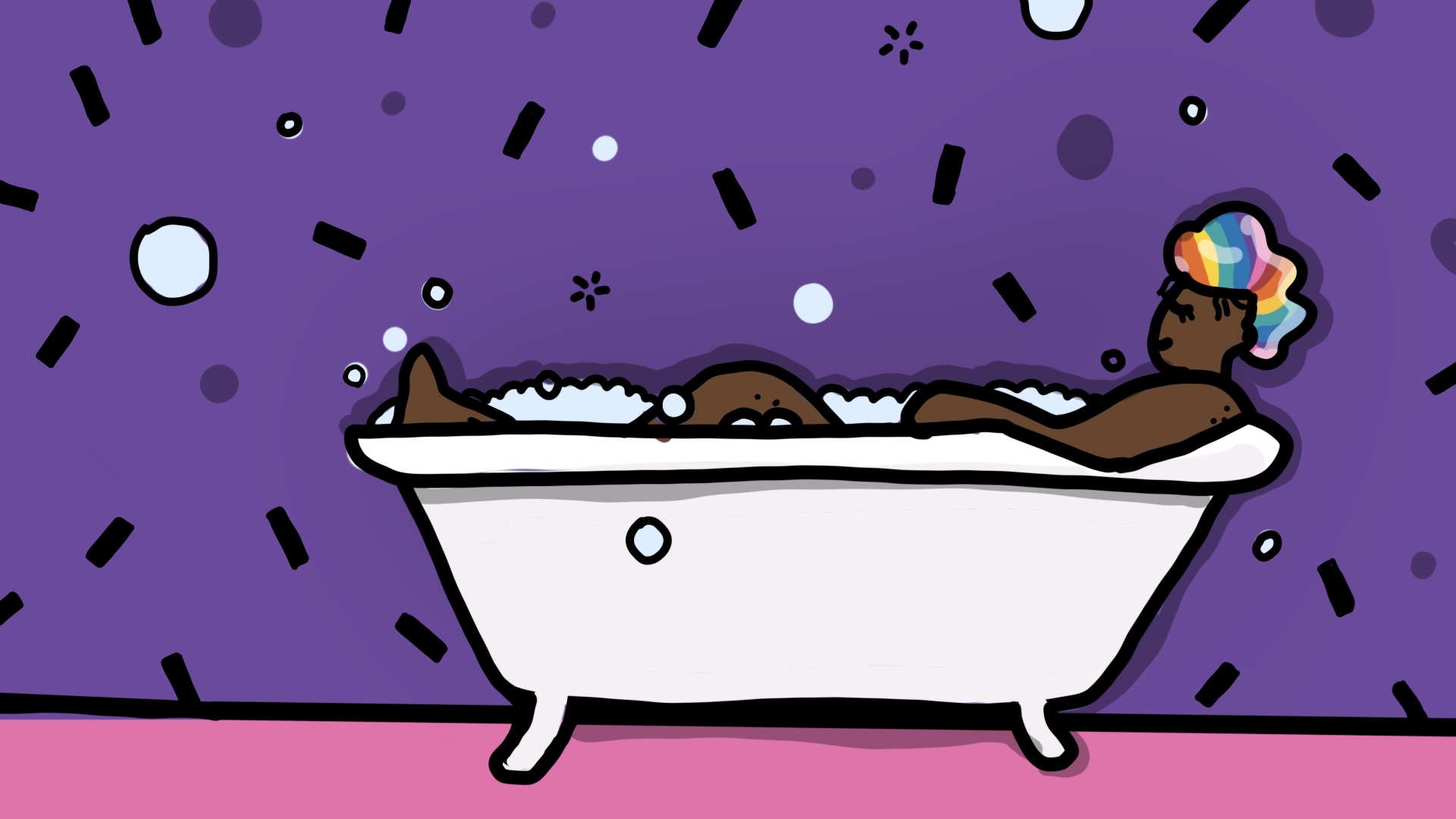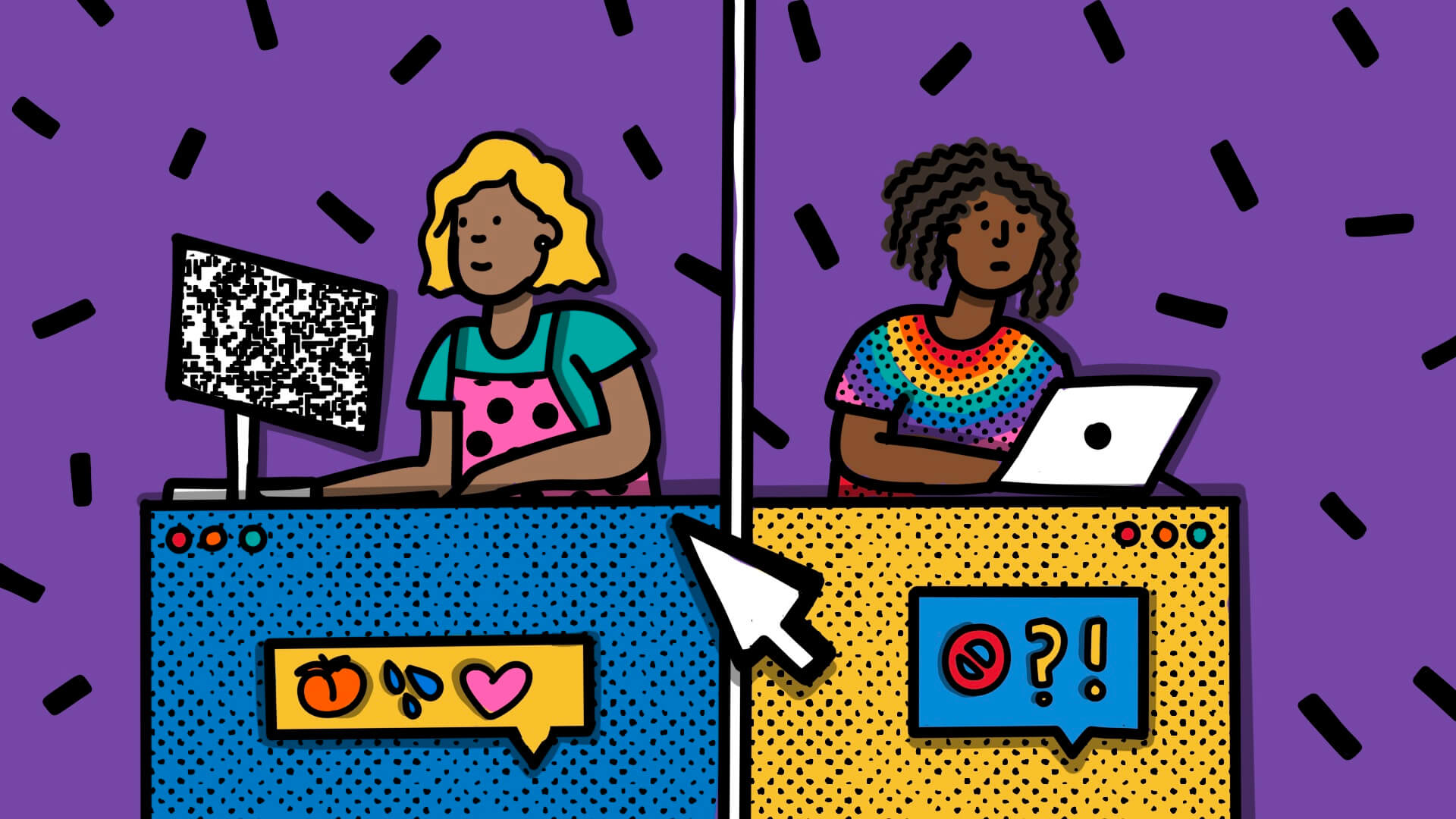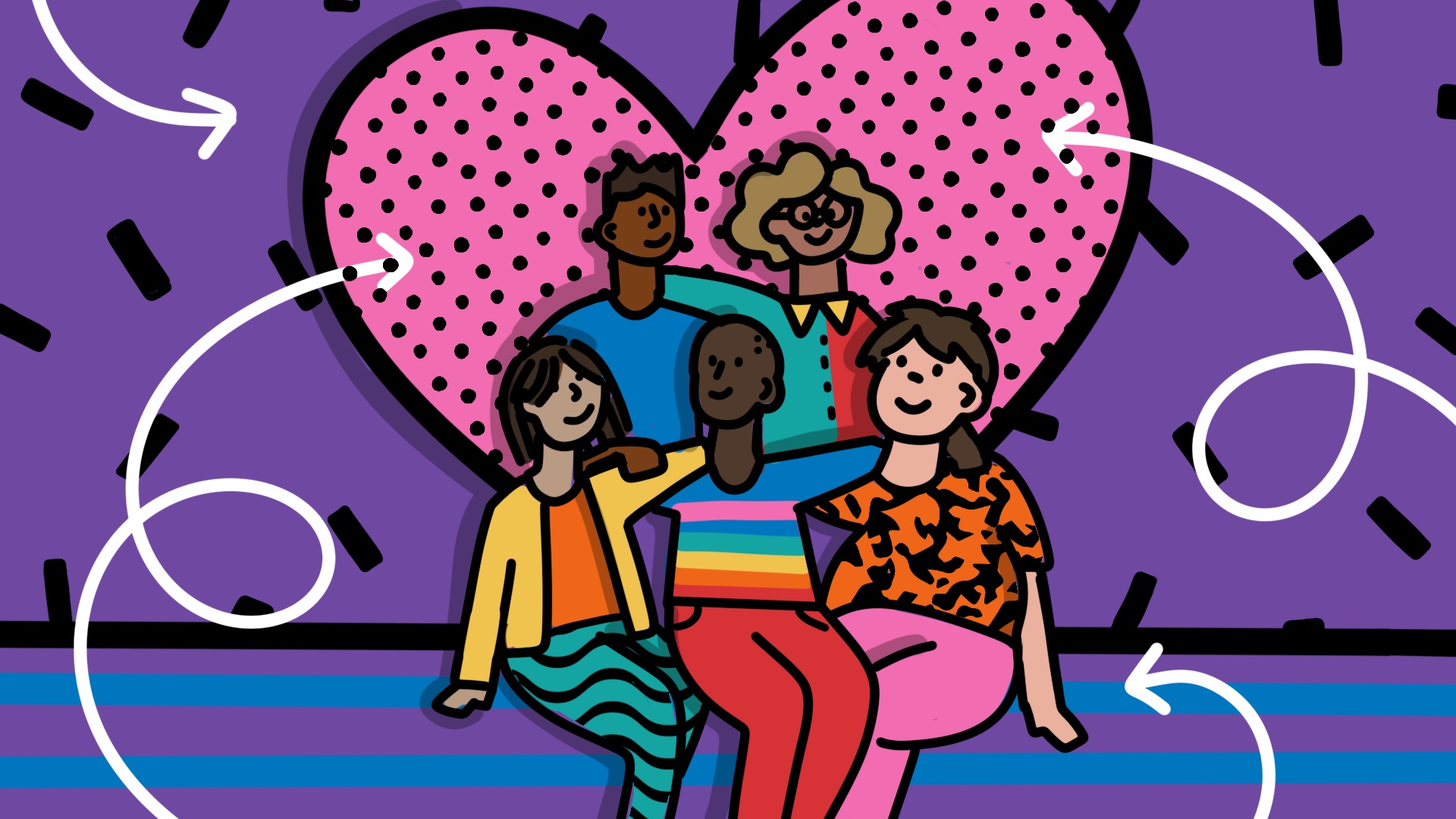
Illustration by Soofiya
Queeries: how do I look after my body when my dysphoria is bad?
Prioritising personal hygiene can be a challenge when you're dealing with body and gender dysphoria, but our fagony aunt might just have a solution.
Aisha Mirza
05 Nov 2021
Hello Fagony Aunt,
I’m non-binary and I’ve been having problems with increased body/gender dysphoria recently. I know everyone needs to take care of their body but I was wondering if you have any advice on how to do that when you have dysphoria. For example with moisturising – you can’t really do that in the dark cause you’re gonna end up with missed areas and places where it’s not fully rubbed in, and that means you have to spend time looking at your body. As a Black person, I don’t want to be ashy, so just yeah, any advice please?
Phoenix
Hey Phoenix,
Thanks so much for your vulnerability in asking this question. It has given me a bit of a push to sit squarely within the uncomfortable reality of dysphoria in my own life – something I often swerve in favour of baggy t-shirts and a high-level strategy I like to call not looking in the mirror. It’s kind of amazing, how long I can and have lived in a state of avoidance, minimising my own discomforts, with body and gender dysphoria running into each other like fast-flowing streams, no beginning or ending in sight, just vibes. But you have reminded me it’s possible and important to find peace – momentary, enduring and imagined – that we are capable and so, so deserving of it and that this is not our fault.
I relate hard to trouble moisturising! I had previously attributed my difficulties in this area to my depressive tendencies, though your question has me looking at it a little more expansively. Whatever the reason (and we don’t always have to know!) moisturising and other personal care rituals can feel overwhelming, upsetting, impossible, tedious, gross and/or pointless. So what do we do!?
“Moisturising and other personal care rituals can feel overwhelming, upsetting, impossible, tedious, gross and/or pointless”
If you can, have a think about what kinds of dysphoria you have and how they show up for you because getting to know them can help guide you in ways of dealing with it compassionately. Based on your question it sounds like you’re pretty sight-motivated, but how about touch, movement, smell? For some people the jiggle of a chest is harder to tolerate than the way it looks, for others, holding or caressing the body is ok, but the smell of it can be intolerable. In answering your question I asked people with many different types of dysphoria and ways of dealing with it, for tips, some of which are presented here alongside my own thoughts.
By far the most popular advice for dealing with dysphoria I received in my tiny research was bath-related which is also where I was when I first read your question so I think we may be onto something. Baths are historically iconic among marginalised populations; the sick bathing weary bones, the cruisers looking for a helping hand, and the enbys weightless at last.
Baths are a way of cleansing the body without getting super hands-on and can also be a place of experimentation and play. You can introduce bubbles to your bath because they’re pretty or because they’re something to hide behind. You can run a bath deep enough to float and feel bodiless. You can also play with temperature, enjoying the comfort of being submerged in heat or braving colder temperatures to stimulate the vagus nerve and encourage your body to relax. Some people may also find the steam from baths or showers helpful in obstructing views or feeling held.
“Baths are a way of cleansing the body without getting super hands-on and can also be a place of experimentation and play”
Baths can also be a great place to moisturise! You may want to have a rinse or a full shower first and then fill the bath knowing you’re already clean, or you can jump straight in and do the cleaning and moisturising at once. You can also keep underwear, swimwear or whatever on while bathing if that helps. Run the bath warm or hot and as it’s filling add a bath oil or moisturising agent of your choice. Common ones are half a cup of olive oil or honey or breakfast oats (be extra careful not to slip when exiting)! Depending on how much you used, you won’t need to moisturise further after your bath. You can also do this in the shower, using a glove or loofah to apply if you’d rather not touch yourself directly.
Bathing more intentionally also opens up the possibility for introducing fragrance into your life which was another very popular tip offered by those I asked. Smell is a profoundly underrated sense which we use to taste (as I found out the hard way post-covid). It’s a portal to nostalgia, sensuality, comfort, confidence and mood-boosting. Experimenting with soothing aromatherapy in the bath and gender-affirming perfumes afterwards could help alleviate some dysphoria by forming new positive memories and associations around caring for your body.
Connecting with how good your skin will feel after it’s clean and hydrated and you’re back in bed or out on the town and using textures, smells, colours, patterns and flavours that you find enjoyable to get there might be a way to ease the body-care process by leaning into it and accepting whatever you can do. If using Dora the Explorer strawberry toothpaste means you brush your teeth more, go for it – it’s ok!
“It might also be helpful to think about who can help you when your dysphoria is really hard to overcome”
Sometimes though, that might feel like too much and you may just need to dissociate or distract yourself from the whole goddamn process. Turn the lights off, close your eyes, light some strong incense, listen to a murder podcast or loud music. Rock out, sing along or try thought experiments like visualising your body the way you want it in that moment or thinking of your body not as you, but as a thing or person that you’re responsible for taking care of. When it comes to drying, you can also use a hairdryer to aid the process if you don’t want to feel your body.
It might also be helpful to think about who can help you when your dysphoria is really hard to overcome. Do you have friends or partners that you trust enough to help you moisturise either physically or by assisting/keeping you company on loudspeaker? Would you feel comfortable asking them to give you a tight squeeze before or after the bathing process to help you decompress? Have you found online communities that might be supportive? (Facebook has a group for e v e r y t h i n g).
You might feel motivated by rewards such as having a hot chocolate, clean sheets or favourite outfit waiting, or hanging a countdown to gender-affirming surgery or a photo of a time you felt good in your body somewhere you can see it when you may be struggling to remind yourself that you won’t be stuck in this dysphoric feeling forever. You could also put some kind of recurring self-care day in your calendar, allowing you to carve out some proper time for all of this, and honouring that it’s not always easy for you. Invest in some crisp linens that will keep you cool and cover your body in hot weather if you think you might be ashy but don’t feel up to dealing with it. It’s important you also remember to give yourself permission to rest. Sometimes you just won’t be able to moisturise and that’s ok.
Here are some thoughts that were shared with me about general dysphoria which might also be helpful:
“It’s kind of extreme, but I’ve mostly cut out mirrors/pictures of myself from my life. Friends/family take pictures, but know not to show me/tag me. That’s helped a ton, bc I’m not looking at my body from a perspective I can’t control.”
“Frosting over certain parts of my mirror just enough that I don’t see the things I don’t wanna see helps me a lot.”
“Removing outside perspectives of my body helped me care for myself when my dysphoria was at its worst. Idk, I wasn’t ignoring my body, but rather ignoring how other people may have seen it.”
“Extremely bright and ridiculous clothing that cheers me up and is more about the clothing than about my body. People do notice, but I expect them to, so I feel like I have more control over it.”
“I try to find the most comfy/warmest/softest clothes I have for comfort instead of tryna be cute.”
“I love dancing to focus on how my body moves and feels instead of how it looks.”
“I swim in the sea to remind myself of my body’s strength.”
“Things that help me are weighted blankets, dyeing or cutting my hair, new tattoos/outfit, getting my nails done, laughing with friends, masturbating, hot water bottles, chaotic makeup, science fiction, grounding through meditation and exercise.”
“I really enjoy hats & sunglasses – whatever the weather lol I go incognito.”
“I try to have gratitude for everything my body has carried me through”
“I like spending time with animals bc they dont gaf.”
“I try to express anger safely to get it out of my cosmic body.”
“It helps to remember that my body is an extension of Earth & she is all genders and more.”
“I know it can be so painful but try to listen to and make space for the dysphoria and be sure to show it and yourself some love.”
“Turn off the lights, go to sleep and try again tomorrow.”
If you would like to submit a question to Aisha for a future Queeries, please use our confidential, anonymised submission form.
This is part of the Queeries column





